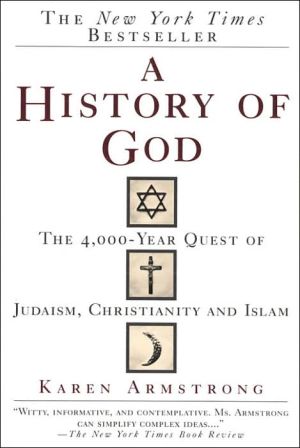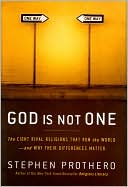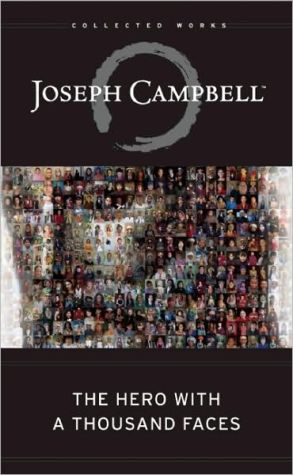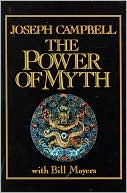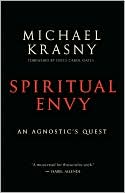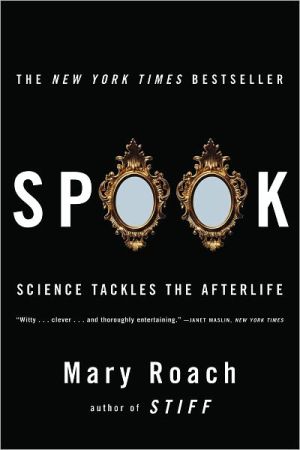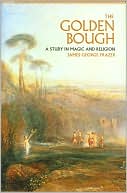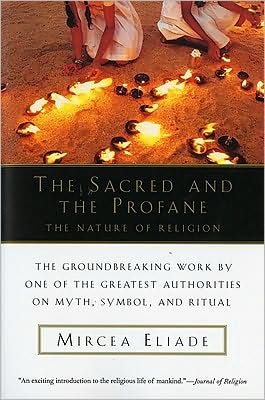A History of God: The 4000 Year Quest for Judaism, Christianity and Islam
"An admirable and impressive work of synthesis that will give insight and satisfaction to thousands of lay readers."\ THE WASHINGTON POST BOOK WORLD In this stunningly intelligent book, Karen Armstrong, one of Britain's foremost commentators on religious affairs, traces the history of how men and women have perceived and experienced God, from the time of Abraham to the present. From classical philsophy and medieval mysticism to the Reformation, the Enlightenment, and the modern age of...
Search in google:
"An admirable and impressive work of synthesis that will give insight and satisfaction to thousands of lay readers."THE WASHINGTON POST BOOK WORLD In this stunningly intelligent book, Karen Armstrong, one of Britain's foremost commentators on religious affairs, traces the history of how men and women have perceived and experienced God, from the time of Abraham to the present. From classical philsophy and medieval mysticism to the Reformation, the Enlightenment, and the modern age of skepticism, Karen Armstrong performs the near miracle of distilling the intellectual history of monotheism into one superbly readable volume, destined to take its place as a classic. Publishers Weekly This searching, profound comparative history of the three major monotheistic faiths fearlessly illuminates the sociopolitical ground in which religious ideas take root, blossom and mutate. Armstrong, a British broadcaster, commentator on religious affairs and former Roman Catholic nun, argues that Judaism, Christianity and Islam each developed the idea of a personal God, which has helped believers to mature as full human beings. Yet Armstrong also acknowledges that the idea of a personal God can be dangerous, encouraging us to judge, condemn and marginalize others. Recognizing this, each of the three monotheisms, in their different ways, developed a mystical tradition grounded in a realization that our human idea of God is merely a symbol of an ineffable reality. To Armstrong, modern, aggressively righteous fundamentalists of all three faiths represent ``a retreat from God.'' She views as inevitable a move away from the idea of a personal God who behaves like a larger version of ourselves, and welcomes the grouping of believers toward a notion of God that ``works for us in the empirical age.'' 25,000 first printing; BOMC alternate. (Oct.)
MapsIntroduction1In the Beginning . . .32One God403A Light to the Gentiles794Trinity: The Christian God1075Unity: The God of Islam1326The God of the Philosophers1707The God of the Mystics2098A God for Reformers2579Enlightenment29310The Death of God?34611Does God Have a Future?377Glossary401Notes409Suggestions for Further Reading427Index437
\ Publishers Weekly - Publisher's Weekly\ This searching, profound comparative history of the three major monotheistic faiths fearlessly illuminates the sociopolitical ground in which religious ideas take root, blossom and mutate. Armstrong, a British broadcaster, commentator on religious affairs and former Roman Catholic nun, argues that Judaism, Christianity and Islam each developed the idea of a personal God, which has helped believers to mature as full human beings. Yet Armstrong also acknowledges that the idea of a personal God can be dangerous, encouraging us to judge, condemn and marginalize others. Recognizing this, each of the three monotheisms, in their different ways, developed a mystical tradition grounded in a realization that our human idea of God is merely a symbol of an ineffable reality. To Armstrong, modern, aggressively righteous fundamentalists of all three faiths represent ``a retreat from God.'' She views as inevitable a move away from the idea of a personal God who behaves like a larger version of ourselves, and welcomes the grouping of believers toward a notion of God that ``works for us in the empirical age.'' 25,000 first printing; BOMC alternate. (Oct.)\ \ \ \ \ Library JournalArmstrong ( Muhammad , LJ 4/15/92; The Crusades and Their Impact on Today's World , LJ 2/15/91) presents a well-written overview of the changing idea of God as understood by the three great religions of the West. Besides providing a great deal of religious history, she discusses the various philosophers, mystics, and reformers associated with these religions. The author suggests that ``God'' is primarily a ``focus of meaning'' created by humanity. If He survives at all, it will be in a much-altered form. Public librarians should be aware that conservative readers may be offended by this book, and even religious scholars may find Armstrong's rather one-sided ``death of God'' optimism about humanity a bit passe. Otherwise, this is an excellent and informative book. Recommended for academic and public libraries.-- C. Robert Nixon, MLS, Lafayette, Ind.\ \ \ Kirkus ReviewsSuperb kaleidoscopic history of religion, from an English nun- turned-scholar. Armstrong (Holy War, 1991, etc.) was a nun in the early 1960's but left her convent in 1969 as part of the great wave that defected from religious life at that time. Although her faith grew progressively weaker, her fascination with religion didn't abate, and, even as a nonbeliever, she continues to pursue theological studies. Here, her basic message is that "religion is highly pragmatic. We shall see that it is far more important for a particular idea of God to work than for it to be logically or scientifically sound." In an extraordinary survey, Armstrong traces the development of Judaism, Christianity, and Islam from their inception to the present day, and shows how they were created and shaped by their historical surroundings—which, in turn, they helped form and alter. Although this approach is standard among religious scholars, Armstrong uses it to particular advantage in underscoring the historical correspondences among the three faiths—for example, examining the messianic fervor that surrounded the career of the Sabbatai Zevi (the 12th-century rabbi who built up an enormous apocalyptic cult among diaspora Jews prior to his imprisonment and conversion to Islam) in light of the early Christian response to the crucifixion of Jesus or of Jeremiah's prophecies about the destruction of Jerusalem. It's particularly in the mystical traditions, according to Armstrong, that the different faiths corroborate each other—in large part, she says, because the mystical apprehension of the divine is more abstract and therefore less dependent upon the traditional symbols by which most religions distinguishthemselves. There are major gaps in Armstrong's history—she pays little attention to the Christian churches of the 20th century—but she manages against the odds to provide an account that's thorough, intelligent, and highly readable. Magisterial and brilliant.\ \
